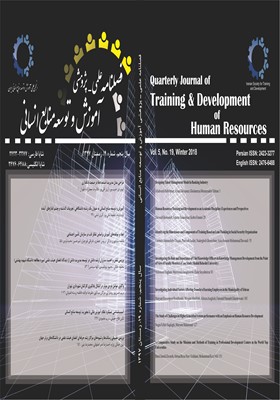طراحی الگوی توانمندسازی کارکنان بانک سپه براساس یادگیری سازمانی
الموضوعات :مرضیه دمیرچی 1 , رسول حسینی 2 , معصومه اولادیان 3
1 - دانشگاه آزاد اسلامی دماوند
2 - دانشگاه فرهنگیان
3 - دانشگاه آزاد اسلامی دماوند
الکلمات المفتاحية: توانمندسازی کارکنان, یادگیری سازمانی, سازمان یادگیرنده, الگوی توانمندسازی, بانک سپه.,
ملخص المقالة :
رقابت در دنیای امروزی داشتن دارایی نیست بلکه داشتن دو عنصر سرمایه گذاری بر دانش و یادگیری و آموزش کارکنان توانمند است. هدف پژوهش حاضر طراحی الگوی توانمند سازی کارکنان بر اساس یادگیری سازمانی میباشد. روش تحقیق از نظر ماهیت کیفی-کمی (آمیخته) از نظر نوع کاربردی و از روش های تحقیق آمیخته، از شیوه اکتشافی، از نوع متوالی استفاده شده است. ابزار گردآوری دادهها، در بخش کیفی مصاحبه نیمه ساختار یافته و در بخش کمی پرسشنامه محقق ساخته می باشد. جامعه آماری در بخش کیفی، خبرگان و مطلعین کلیدی منابع انسانی در نظام بانکی و دانشگاه ها می باشند. روش نمونه گیري در بخش کیفی، غیر احتمالی شامل تکنیک هاي هدفمند(زنجیره ای و گلوله برفی) که بر مبناي آن تعداد 18 مصاحبه با اساتید دانشگاه و خبرگان بانکداری صورت گرفته و از بین ایشان، با 10 نفر از طریق گروه کانونی مصاحبه شده است. جهت تجزیه و-تحلیل اطلاعات در بخش کیفی از روش تحلیل محتوا و کدگذاری باز، محوری و گزینشی ، و نرم افزار مکس کیودا استفاده شده است. جامعه آماری در بخش کمی، مدیران بانک سپه و تعداد جامعه 322 نفر بوده که نمونه 175 نفری با استفاده از فرمول کوکران و با روش نمونه گیری طبقه ای انتخاب شده اند. برای تجزیه و تحلیل اطلاعات در بخش کمی، از روش معادلات ساختاری و نرم افزار پی. ال. اس استفاده شده است. الگوی به دست آمده شامل روابط یادگیری سازمانی و توانمند سازی کارکنان، مولفه-ها، شاخص ها و پیامدهای توانمندسازی بر اساس یادگیری سازمانی است. بر اساس یافته های تحقیق، توانمندسازی کارکنان بر اساس یادگیری سازمانی؛ موجب افزایش بهره وری، شایسته سالاری و ... در بانک سپه می شود.
1. Amit S, Shailendra S, Himanshu R. Abhijit Bhattacharya Employee Empowerment Leading to Flexible Role Orientation: A Disposition Based Contingency Framework. IIMB Management Review. 2018; 21(2): 12-25.
2. Saadat E. Human resources management. 2011. Tehran: Samt Publishers.
3. Divesh O, et al. Supply chain organizational learning, exploration, exploitation, and firm performance: A creation-dispersion perspective. International Journal of Production Economics. 2018; 204(1): 70-82.
4. Khurshid A. Part of the series The World Council of Comparative Education Societies. Globalized Local & Localized Global in a Women’s Education. 2016; 6(2):23-39.
5. Allahyari R, et al. Survey of relationship between the psychological empowerment of employees with organizational learning. Procedia - social and behavioral sciences. 2011; 30(1): 1549-54.
6. Acacia N. Vocational Training & Agency Among Kenyan Youth. 2016; 11(1): 57-63.
7. Orr B. Organizational learning: characteristics of learning organizations. Canadian H R Reporter. 2000; 13 (10):34-53.
8. Senj P. The fifth command. Translated by Hafez Kamalehedayat &Mohammad Roshan. 2007. Tehran: Publishers Industrial Management Institute.
9. Huber G.P. Organizational Learnin: The Contributing Process & the Literature. Organization Science. 1991; 37(1): 87-98.
10. Rahnavard F. Learning organization & learned organization. 1999; 7(2): 23-31.
11. Skerlavaj M, Stemberger M.I, Skrinjar R, Dimovski V. Organization learning culture- the missing link between business process chang & organizational performance. Int. j. production Economics. 2007; 106(1): 57-71.
12. Hosnavi R, Ramezan M. Increased intellectual capital in the organization. Investigating the role of organizational learning. Management Improvement Journal. 2017; 5(1): 25-39.
13. Johnson L. Culturally Responsive Leadership for Community Empowerment. 2016; 9(1): 183-199.
14. Spritzer G.M, Kiziols M.A, Nason S. w. a dimensional Analysis of the Relationship between Psychological Empowerment & Effectiveness, Satisfaction & Strain. Journal of Management. 2007; 23(1): 43-56.
15. Scott B, Christian D. Ethical leadership and employee success: Examining the roles of psychological empowerment and emotional exhaustion. The Leadership Quarterly L.Greenbaum. 2018; 7(2): 97-108.
16. Ardharn K, Vinai P. Structural equation model to assess the impact of learning organization and commitment on the performance of research organizations Kasetsart. Journal of Social Sciences. 2018; 39(1): 457-462.
17. Robinz E. Organization Theory Structure, design and applications. Ttranslated by Seyed Mahdi Alvani & Hasan Danaeefard. 2002. Tehran: Safar.
18. Conge J.A, Kanungo R.N. The empowerment process: integrating theory & practice. Academy of Management Review. 1998; 13(1): 67-81.
19. Zimmerman M.A. Taking aim on empowerment research: On the distinction between individual & psychological conception. American Journal of Community Psychology. 1990; 8(2): 19-38.
20. Bennis W, Nanus B. Leaders: The strategies for taking charge. New York: Harper & Row. 1998; 5(1): 116-189.
21. Bazarghan A. Mixed research methods: A superior approach to studying and solving educational problems. Quarterly Schools Efficient. 2008; 6(1): 31-44.


